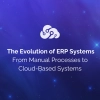TRANSFORMING YOUR BUSINESS WITH ERP SYSTEMS
• Introduction
• Benefits of implementing ERP systems
• Common challenges of ERP implementation
• Choosing the right ERP system
• Planning for successful ERP implementation
• Conclusion
Introduction
ERP systems are not just fancy buzzwords, they are powerful tools that can drive your business towards long-term success. ERP stands for Enterprise Resource Planning, which essentially means integrating all the different aspects and functions of your business into one comprehensive system. The history of ERP systems can be traced back to the 1960s, but it wasn't until the 1990s that they became popular. These days, ERP systems are almost ubiquitous in the business world. But why do ERP systems matter? Well, imagine having all your business data and processes organized and accessible in one place. Accounting, human resources, production, logistics, sales, and customer relationship management - all integrated into a single system. This means more efficient processes, improved data accuracy, and better decision making. And with the right implementation and vendor support, ERP systems can help take your business to the next level.
Benefits of implementing ERP systems
You don't need to be a business expert to appreciate the benefits of ERP systems. These tech wonders are perfect for every business out there. With ERP systems, you can streamline everything and increase your efficiency in every aspect of your business. Say goodbye to the days of juggling endless spreadsheets to manage your inventory and customers. With an ERP system, you can manage everything with ease. But the big question is, how does an ERP system help you make better decisions? Well, with accurate data, you can analyze your business performance, identify bottlenecks, and make strategic decisions accordingly. No more relying on inaccurate data and gut instincts to make critical business decisions. And don't forget about the security and integration benefits of ERP systems. You can keep all your data secure and provide access to the relevant employees. Plus, with integration options, you can bring all your business functions under one umbrella and have a cohesive view of your operations. Implementing an ERP system can be a game-changer for your business. It'll make your business more efficient, secure, and help you make informed decisions. So, choose the right ERP system for your business and take the next step towards success!
Common challenges of ERP implementation
Implementing an ERP system isn't all rainbows and unicorns. It comes with its fair share of challenges, more like mountains to climb. Let's educate ourselves on what to expect while embarking on the path of transformation. Firstly, the cost of implementing an ERP system can be steep. You need to factor in software licenses, hardware requirements, and the cost of hiring consultants who will help with implementation and customization. All these can put a dent in your business's finances. Another challenge is staff training and resistance to change. ERP systems require a different approach to process workflows, which may result in reduced productivity at first. It's essential to invest in continuous staff training to help them adapt and operate the new system efficiently. Integration with existing systems can be a headache as it may require additional resources, time, and efforts. Plus, there's always the risk of data loss or corruption during integration. Lastly, lack of vendor support can be frustrating, may cause project delays, and increased costs. It's essential to choose a reliable and trustworthy vendor with a good reputation in the market. With these challenges in mind, it's crucial to plan and prepare yourself accordingly. Keep in mind that implementing an ERP system is a marathon rather than a sprint.
Choosing the right ERP system
Choosing the right ERP system can be a daunting task, but it doesn't have to be. The key is to assess your business's needs carefully. You don't want to end up with an ERP system that doesn't address your needs, or worse, one that overcomplicates things. So, take the time to evaluate your business processes and identify areas where automation and integration would benefit you the most. Once you have a good understanding of your company's needs, it's time to look at the different types of ERP systems available. The four main types are on-premise, cloud-based, open-source, and hybrid systems. Each system has its own strengths and weaknesses, so you'll want to consider which one would be the best fit for your business. But don't worry, you don't need to become an expert on all of them. Do some research, read reviews, and ask for recommendations from other business owners. Vendor evaluation is also an essential step in choosing the right ERP system. Don't fall into the trap of being sold on the latest and greatest feature that you don't need. Look for a vendor with a track record of providing excellent support and service. You should also consider the vendor's experience in the industry and its reputation. Customization options can be a significant factor in your decision-making process. Some vendors offer more customization options than others. Make sure you understand what you can and cannot customize before you make your decision. Remember, the more you customize your ERP system, the more time and resources it will take to implement and maintain. Choosing the right ERP system doesn't have to be a stressful experience. Take the time to assess your business's needs, look at the different types of systems available, evaluate vendors effectively, and consider customization options carefully. With some careful planning, you'll be well on your way to transforming your business with the right ERP system.
Planning for successful ERP implementation
Implementing an ERP system can be a daunting task. However, proper planning and execution can make the process much smoother. Creating a project plan is the first step towards a successful implementation. It should include timelines, goals, and responsibilities for each team member. The plan should be flexible to accommodate changes, but also rigid enough to ensure accountability. Gathering and migrating data can also be a challenge. It's important to only migrate relevant data and to have a backup plan in case of data loss. This is also a good time to cleanse data and eliminate duplicates. Testing and training will ensure that the ERP system is working as intended and that all employees are familiar with its functions. Testing should be conducted in various scenarios to identify and address any issues that may arise. Training should be provided to all employees and tailored to their specific roles. Establishing ongoing support and maintenance is crucial to ensure that the ERP system continues to function optimally. This includes having a dedicated team to address any issues and provide updates as needed. While the implementation process can be overwhelming, it's important to keep the end goal in mind. A successful implementation will streamline processes, improve data accuracy, and ultimately lead to better decision making. So, let's buckle up and get ready for the ride!
Conclusion
The future of ERP systems looks promising with advancements in technology and increasing demand from businesses seeking efficiency and integration. Choosing the right vendor and implementation strategy is crucial for successful ERP adoption. Don't take shortcuts, invest time and resources wisely.






